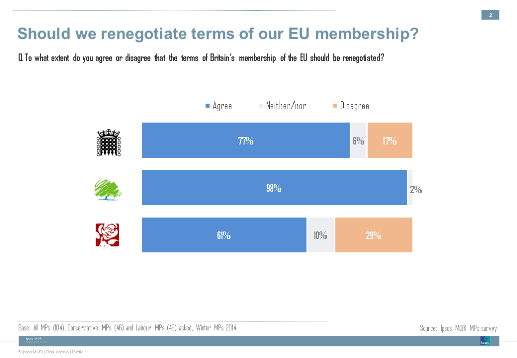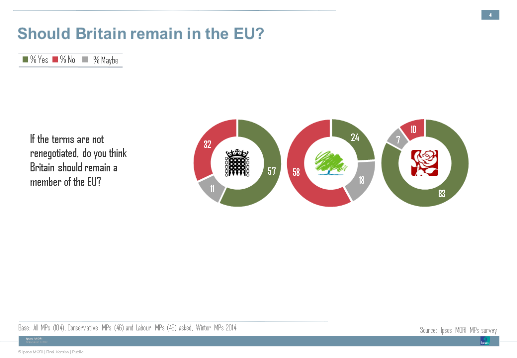Are we in or out? Britain's future with the EU

In January 2013 David Cameron made a promise to the British public. Amid unusually high levels of opposition to the EU throughout the country, he pledged to hold a referendum on EU membership in 2017 under two conditions: that the Conservatives win an outright majority in May 2015’s General Election and that it would follow a period of renegotiation with the European Union as regards Britain’s membership.
The latest voting intentions in Great Britain put Labour (34%) just one point ahead of the Conservatives (33%). It is undoubtedly close, but given that the Conservatives probably need at least a 10% lead over Labour to win a majority, it is looking increasingly unlikely that Britain will have a chance to vote on EU membership.
But what do MPs think will happen in 2017?
Well, fewer than half (46%) think there will be a referendum while just over a third (36%) think the opposite. The partisan split here is significant and reflects party lines; unsurprisingly, 80% of Tory MPs think Britain will hold a referendum (the remainder are largely unsure) compared to only one in ten Labour MPs. In contrast, seven in ten (69%) Labour MPs think there will be no referendum in two years’ time.

When it comes to predicting how the public would vote in a referendum, MPs are unable to reach any clear consensus. Three in ten (29%) predict the public would vote to leave the EU while over four in ten (44%) think they would vote to remain a member. A quarter (27%) think it is too close to call. A closer look at the figures by party split though reveals that both sides of the House have almost exactly opposing views on the potential outcome of an in-out vote.

Just over two fifths (43%) of Conservative MPs envisage the public voting in favour of an EU exit while only one in ten (10%) Labour MPs say the same. But what does the reality look like? An Ipsos poll in October 2014 which asked the public about their voting intentions on EU membership if there were a referendum now, showed that just over a third (36%) would opt to leave. This is the lowest this figure has been since June 2000 and it is significantly lower than the 48% of people who said they would opt to leave at the end of 2012, just weeks before Cameron made his referendum promise.
Labour’s assessment of public opinion on the matter appears to be more accurate than that of the Conservatives when the proportion of the public that would vote to remain a part of the EU is considered. A majority of Labour MPs (61%) think the public would vote to stay in the EU should a referendum take place in 2017 and the terms of the UK’s membership have not changed. A majority of the public (56%) say they would vote in favour of continued membership and this is the highest this figure has been for over 20 years. Only a third (33%) of Conservative MPs think that the public would vote to stay in, illustrating that their Labour counterparts are much more in tune with public opinion.
In light of anxiety about the transfer of excessive British sovereignty to Europe, Cameron accompanied his referendum promise with a pledge to renegotiate the terms of Britain’s relationship with the EU in the run up to 2017. Cameron wants Britain to remain a member of the EU, but a reformed EU, one in which Britain has a ‘better deal,’ and there is widespread support for renegotiation in Parliament. Over three-quarters (77%) of MPs think the terms of Britain’s membership should be renegotiated while only two in ten (17%) disagree, a figure driven exclusively by Labour MPs who, typically, are strong advocates of the European Union. While Labour MPs are somewhat split on the issue (61% agree and 29% disagree), the Tories are united. Almost all (98%) of those interviewed by Ipsos last winter think the terms of Britain’s membership of the EU should be renegotiated.

So what needs to change, according to MPs? The freedom of movement principle, though a fundamental tenet of the Union, is one which MPs think most necessitates change. Half (49%) of MPs say this, with no significant variation between Conservative and Labour MPs. Taking back more control over Britain’s legislature and judiciary (32%) and foreign policy (25%), as well as Britain’s financial contribution to the EU (16%), are other areas MPs single out for change.
The implications for the future of EU membership of not renegotiating the terms are envisioned to be far greater amongst the Conservatives than they are on the Labour benches. Six times as many Tories (58%) think Britain should leave the EU should no renegotiations take place; only 10% of Labour MPs feel this way. In fact, four-fifths (83%) of Labour MPs think Britain should remain a member, regardless of renegotiations, highlighting the party’s staunch commitment to the EU project.

On February 10th of this year, the Director General of the British Chambers of Commerce, John Longworth, called for the referendum to be brought forward and held ‘as soon as possible,’ namely as early as 2016. The Tory reaction to this has been warm which implies that the Conservatives continue to think withdrawal is a realistic option. Let us not forget, however, that the British public will have full control of the reins both in May’s general election and, if it goes ahead, an EU referendum in 2017. A combination of current voting intentions (putting the Conservatives and Labour neck and neck) and current public sentiment towards Europe (at an all-time high) suggests that it may be bad news for Euro sceptics. No member state has ever relinquished its membership of the European Union and it seems highly unlikely that Britain will be the first to do so – at least not as soon as 2017.
- Ipsos’s MPs' survey runs twice annually, interviewing a representative sample of c.100 MPs from the UK House of Commons. Interviews are conducted face-to-face.
- Public data: c. 500-2000 British adults aged 18+ were asked: If there were a referendum now on whether Britain should stay in or get out of the European Union, how would you vote?



